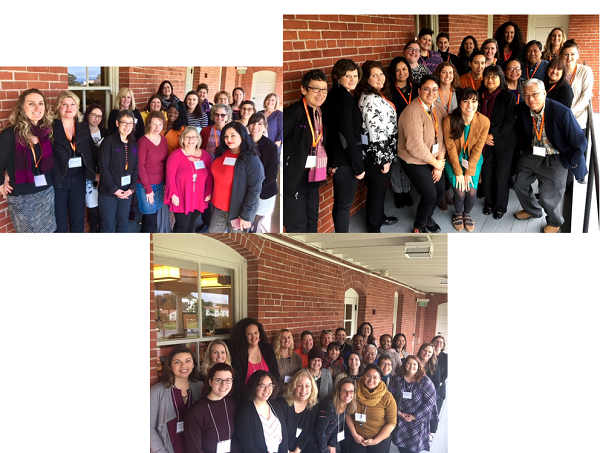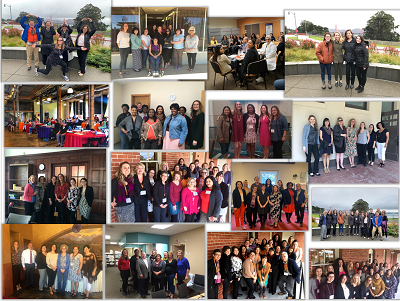Project Catalyst: State-Wide Transformation on Health, IPV, and Human Trafficking
Project Catalyst was a four year initiative funded through a collaboration of U.S. Department of Health and Human Services (DHHS) partners, including the Administration for Children and Families’ (ACF) Family and Youth Services Bureau, the HRSA Bureau of Primary Health Care, and the HRSA Office of Women’s Health. Technical assistance and training was provided by FUTURES, along with an evaluation conducted by the University of Pittsburgh. For more information about Project Catalyst, download our 3 pager and watch the recorded webinar “Lessons Learned from Project Catalyst: State/Territory-Wide Transformation on Health, Intimate Partner Violence, and Human Trafficking.”, and learn how HRSA Addresses IPV at the Community Level.
Through Project Catalyst: State/Territory-Wide Transformation on Health, Intimate Partner Violence, and Human Trafficking, Futures Without Violence partnered with several states and one territory to foster intimate partner violence (IPV), human trafficking (HT), and health leadership and collaboration at the U.S. state and territory level to improve the health and safety outcomes for survivors of IPV and HT and to promote prevention. From 2017 to 2021, FUTURES provided training and technical assistance for state/territory leadership teams consisting of leaders from each state/territory’s Primary Care Association, Department of Health/Public Health/Human Services, and Domestic Violence Coalition. Participating Project Catalyst states/territories included:
- Phase I: Arkansas, Connecticut, Idaho, and Iowa (Minnesota participated as a self-funded team)
- Phase II: Colorado, Guam, and North Carolina
- Phase III: Georgia, Minnesota, and Ohio
Each state/territory leadership team was awarded funds to:
- promote state-level policy and systems changes that support an integrated and improved response to IPV and human trafficking in community health centers and to other needed services in domestic violence programs.
- offer training and technical assistance to five community health centers and five domestic violence programs (in each state) that will partner with one another on trauma-informed practice transformation.
- implement a vision and strategy to promote policies and practices that support ongoing integration of the IPV and human trafficking response into health care delivery statewide, and significant inroads into implementation of an action plan to train and engage at least 50 percent of the Health Resources and Services Administration (HRSA)-funded health centers by the end of the project period.

Project Catalyst Kickoff Meetings in San Francisco, CA. From left to right: Project Catalyst Phase I (2018), Project Catalyst Phase II (2019), and Project Catalyst Phase III (2020).
Across three phases, Project Catalyst’s 96 demonstration sites (HCs and partnering DV programs) trained:
- 45 Domestic Violence Programs/Community Based Organizations
- 377 Domestic Violence Programs/Community Based Organization Staff
- 51 Community Health Centers
- 1,068 Community Health Center Staff
What is Project Catalyst’s impact so far?
- All health centers that completed follow up assessments reported having a policy in place to see patients alone. This is a key practice to provide privacy and confidentiality for survivors.
- 95% of trained providers reported an increased understanding about the impact of IPV and human trafficking on health.
- Three months after training, providers reported they were almost three times more likely to refer patients to their domestic violence agency partners.
Project Catalyst was preceded by Improving Health Outcomes through Violence Prevention, which worked with 10 community health centers in partnership with local DV programs.

Throughout the three phases of Project Catalyst and the Improving Health Outcomes pilot project, FUTURES staff traveled to participating states/territories to conduct trainings of trainers. Leadership teams trained the five health center and DV program partnerships in their states/territories.
Project Catalyst can be implemented in other interests states/territories. Check out these key resources below:
- Project Catalyst had tremendous impacts and can be replicated and implemented in any state/territory or local community. Our adaptable resources include:
- 3.5 hour Training Curricula for health centers; and another for DV programs
- Interactive exercises for virtual, or in-person trainings
- Adaptable agendas and flyers
- Handouts on safe harbor laws, reflective practice + training video vignettes
- A health intake form for DV programs to assess health needs and connect clients to health centers
- Tools to build partnerships, like a sample MOU
- Evaluation tools and multi-lingual patient and population-specific safety card tools
- COVID-19 telehealth and privacy guidance
Access the full suite of tools that can be used to implement Project Catalyst in other states/territories.
- Visit ipvhealthpartners.org for a toolkit developed by and for community health centers and domestic violence programs looking to forge or expand partnerships.
- Visit Health Partners on IPV + Exploitation HealthPartnersIPVE.org, led by Futures Without Violence and funded by HRSA’s Bureau of Primary Health Care to work with health centers to support those at risk of, or surviving intimate partner violence, human trafficking and exploitation, and to bolster prevention efforts.
- Watch the recorded webinar “Lessons Learned from Project Catalyst: State/Territory-Wide Transformation on Health, Intimate Partner Violence, and Human Trafficking.”
If you have any questions or would like to receive technical assistance, please reach out to: healthpartners@futureswithoutviolence.org
This project was supported through a collaboration of U.S. Department of Health and Human Services (DHHS) partners, including the Administration for Children and Families’ (ACF) Family and Youth Services Bureau, the HRSA Bureau of Primary Health Care, and the HRSA Office of Women’s Health. Technical assistance and training was provided by FUTURES, along with an evaluation conducted by the University of Pittsburgh.





